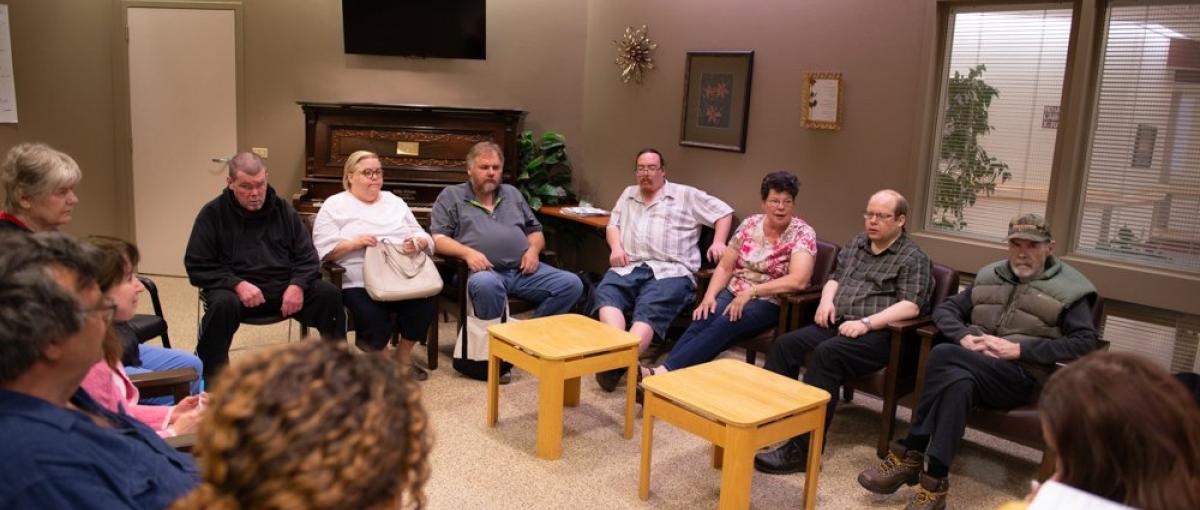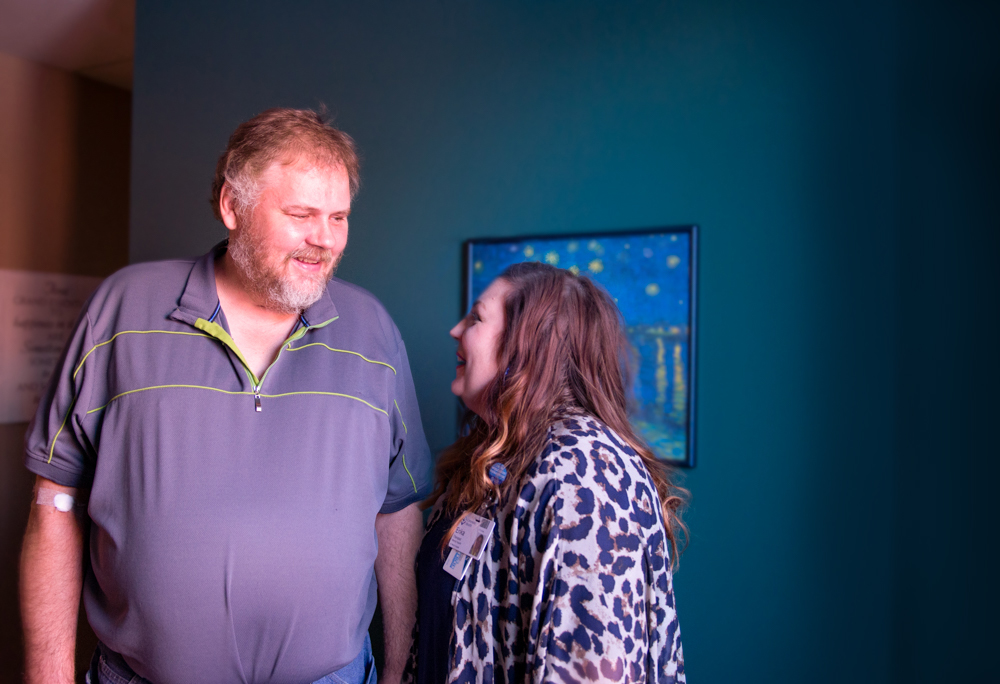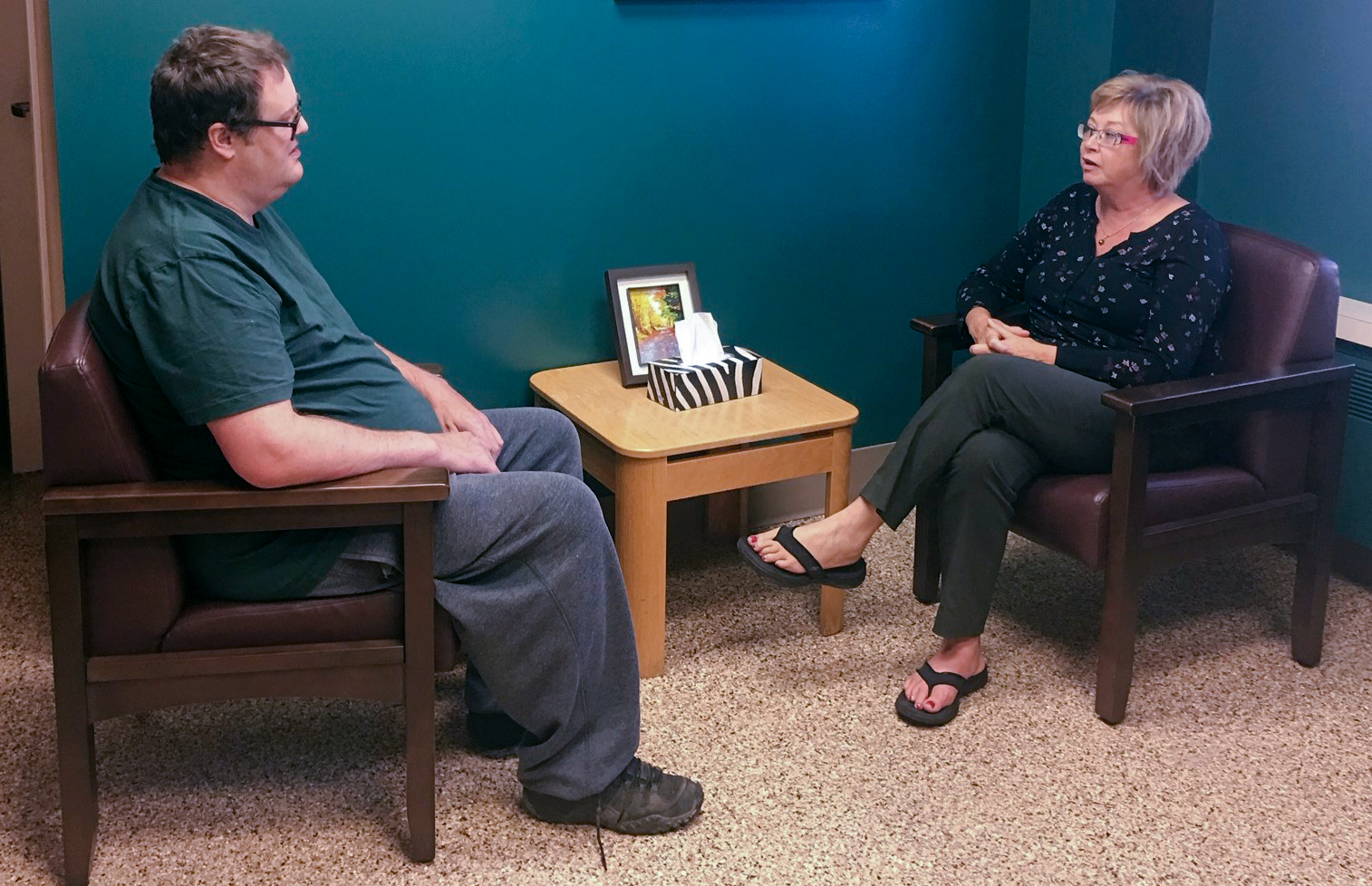People living with schizophrenia support each other
Support group at St. Mary's Hospital has been running for more than 25 years

October 10, 2019
By Marguerite Watson, Senior Communications Advisor, Covenant Health
Every two weeks, Dirk Krueger has a safe place to go where people won't judge him.
The 54-year-old, who works on his family's farm, is an active member of his church and raises prize-winning pigeons, has schizophrenia.
People with mental illness often face fear and judgment from others who don’t understand their condition. That’s why a support group at St. Mary’s Hospital in Camrose is so important to Dirk and 20 other members.
"We discuss things, like if we're having a bad day. We talk about good days too," says Dirk, who was in his late 20s when he was diagnosed with the severe biochemical brain disorder. He lives on the farm with his parents and brother, and though they understand his illness, they don’t talk about it with him.
The group is also a way for Jake Eldey to connect with others in similar circumstances. “It’s good to listen and get support from other people who are on medication, not just people who care," says Jake, 48. He was diagnosed with schizophrenia in his 30s after having severe anxiety, delusions and other symptoms.
People with schizophrenia can experience social withdrawal and lose mental abilities like memory, reasoning and decision-making. The Camrose hospital support group formed in 1992 to help schizophrenia patients share their experiences and build social and life skills.
Treatment at the hospital combines drug therapy to deal with the biochemical imbalances in the brain; psychological therapy to address the thinking and feelings that come with symptoms; and social interaction to ensure patients can function, care for themselves and be part of the community, says Dr. Hany Shaltout, Psychiatrist, St. Mary's.
"The support group is important because it brings people out of their house to develop socially appropriate skills and become motivated about their care," says Hany.
That was certainly a need when the group began. Shelly Dalueg and Angela Badry, both outpatient therapists who work with the group, remember that some members were coming in undernourished.
"They'd been hiding in their parents’ basement or not working and generally not taking care of themselves,” Shelly says. For others, nutrition was an issue because the drug therapy created weight gain, says Angela. "They didn't know how — or what — to cook. Fast food was the easiest thing."
The group leaders can also lend a listening ear when members have concerns. “Sometimes we just spend time reminding them they're valuable. They're important to each other and to us,” says Erika Wilcox, Mental Health Therapist, who also works with the group.

Dirk Krueger, a support group patient, and Erika Wilcox, mental health therapist.
Dirk spent time in four psychiatric hospitals before he was treated and joined the group. He says the group has helped change his "very tumultuous" life to a life that's "really manageable." "I've been able to live a life that's normal," says Dirk, who’s been part of the group for 25 years.
Likewise, Jake has seen a shift in his life since getting drug therapy and becoming a group member. He doesn’t suffer from delusions or anxiety, and he spends almost every evening having coffee with staff at a 24-hour restaurant near the home he shares with his mother, Doreen.
"They’re so good to him there,” Doreen says. “If he doesn’t come home, I phone and tell them he has to take his meds."
Doreen says she advised Jake to tell people he has schizophrenia soon after he was diagnosed with the illness. Though that kind of sharing might have been scary for him, living in the small town of Sedgewick helped. Jake has been part of the community so long that his illness is “not an issue,” his sister, Debbie Leslie, says.
“People see him, and they say, ‘Oh, that’s Jake,’” says Debbie.
After 27 years, many of the original group members are still participating. A few are working full time and only come for special occasions or when they need extra support. And some have moved further along and joined groups where they could practice job skills and get other training.

Jake Eldey, support group patient, and Shelly Dalueg, mental health therapist.
Along with peer support for members, the group provides the leaders with a way to monitor members' mental health. If a member misses any group sessions, the leaders follow up and intervene if necessary.
"I think the group has kept them well because we’re able to catch things much earlier if they’re struggling. It has kept them out of hospital for a long time," says Erika.
The leaders can also look out for members who need treatment for other illnesses. People with schizophrenia are 50 per cent more likely to have illnesses like heart disease, cancer or diabetes, and sometimes their physical health is overlooked because of their mental condition, says Shelly.
"We help them advocate for their health. People disregard them quite easily, and they can fall through some pretty big cracks."
Dirk has good wishes for his friends in the group. "I'm hoping everybody will be able to have a regular, good life," he says. "We're a lot like everybody else. We can function just as well as they do. It's just living life."
Facts about schizophrenia
- Schizophrenia affects about 1 per cent of the general population (more than 21 million people) worldwide.
- Symptoms can include psychotic experiences, such as hallucinations (hearing voices) or delusions, abnormal thinking, mood swings, social withdrawal, inability to function in the community and take care of themselves and impaired cognitive skills like reasoning, decision-making and problem-solving.
- The illness typically begins in late adolescence or early adulthood.
- It can be treated effectively, and people can live a productive life.
Sources: Canadian Mental Health Association, World Health Organization